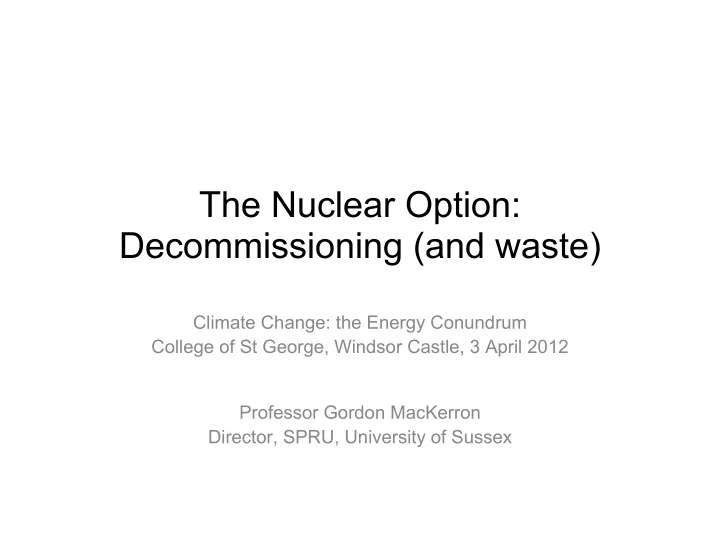

The Nuclear Option: Decommissioning (and waste) Climate Change: the Energy Conundrum College of St George, Windsor Castle, 3 April 2012 Professor Gordon MacKerron Director, SPRU, University of Sussex
In favour of nuclear power…… ● Low life-cycle carbon emissions ● An established technology, replicable in large units ● Uses little land ● Uranium plentiful and needed in small quantities ● Offers a quasi-domestic, apparently secure energy source
But against nuclear power……. ● Safety concerns, magnified since Fukushima ● Security/terrorism vulnerability ● Proliferation questions: dual use technologies ● High construction costs ● Public mistrust, varying by country/time period ● Decommissioning and waste unresolved ● Concentration here is on this last issue
Decommissioning and waste Distinguish between three cases: UK history, UK future, ● and international experience. All three are different Decommissioning – if defined only as de-constructing ● nuclear reactors - may be expensive, but can be done Inter-generational ethical questions arise if this is ● delayed by many decades, as in the UK But if, after de-construction, there were no further ● problems, the issue would not be a major obstacle for nuclear The really difficult issue is how to manage the resulting ● waste, and the spent fuel that is the other main legacy
History of managing UK nuclear legacy is dire This has been complicated by the imperative to ‘re- ● process’ spent fuel – thus acquiring separated plutonium (though in future, reprocessing will stop, thius simplifying things a bit) Management of nuclear legacy in the UK has been one ● of long-term neglect, especially at Sellafield, which will alone cost a further £67 bn. to clean up Stewardship of Nuclear Decommissioning Authority at ● last provides a single-objective organisation – previously BNFL had primary mission of making money, especially via reprocessing
But what to do with the wastes? ● The virtually universal answer is: bury it deep underground ● But no country, despite 50-year history, has yet managed this for civilian wastes ● A major problem is the widespread view that burial means ‘out of sight, out of mind’ ● Very long delays in building repositories, with their risk of future radioactive leakage, raises the issue of inter-generational justice
Legacy wastes ● In UK and elsewhere, there are large stocks of waste already in existence ● The policy question is to find a least-worst solution: no need to look outside the nuclear sector ● CoRWM said: bury it deep provided that community genuinely volunteers: Government agreed ● Logic: risk to near-term generations of storing waste at surface larger than very long-term risk of return of radioactivity from a repository to biosphere
New-build wastes ● These raise different political, social and ethical issues ● Can now choose not to create more wastes at all, as low-carbon alternatives to nuclear exist ● UK Government has chosen to ignore this distinction between legacy and new-build ● But of course if a repository exists for legacy wastes, it is politically easier to gain support for new-build – same repository can host both waste types
Current UK state of play ● Government now starting to consult on volunteering process for local communities to host repository ● Only Local Authorities close to Sellafield are inclined to play – but also geological disputes ● Even if all goes well, and this is far from assured, earliest date for a working repository is 2040 ● Question: does all this meet the 1976 ‘Flowers criterion’: that nuclear construction should not go ahead without the existence beyond reasonable doubt of a method indefinitely to safely contain radioactive wastes?
International context ● Finland and Sweden in the lead – but the leader, Finland, will not have working repository till 2020 ● US has recently abandoned Yucca mountain after many $bn. spent ● Multi-national (or deep sea) solutions often proposed e.g. China or Australia deserts, Kazakhstan, but politics and international law are heavily against ● Difficulty of resolving the waste issue is probably the most durable, troublesome of all nuclear problems
Recommend
More recommend